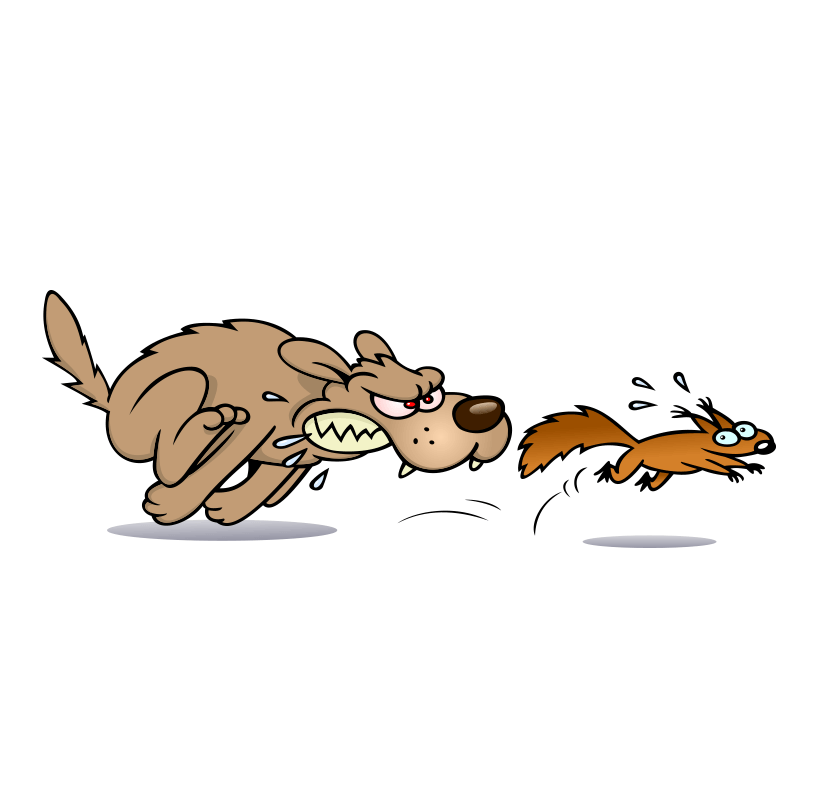Dogs are amazing creatures. They make us laugh, keep our livestock safe (and organized), play with us, lift us up and keep us humble.
One thing you can always count on with dogs is their honesty. Being creatures who are closer to base instinct, but who still have social and intellectual motivations, some days, they can be very humbling. One thing is for certain. You can always count on them to give you an honest inventory of what you've trained and how good of a job you've done.
So here's the question: Are you the type of person who's going to challenge the status quo or are you content to sit still and accept what life, and your dog, offers you?
Okay, that sounds too large. Let's break it down and examine it with the example of squirrel chasing.
Your dog chases squirrels. Lots of dogs do - in fact, I have yet to own a dog who didn't get wide eyed and pumped when they saw a squirrel. They're exciting and fast and most times, they're an intruder in your yard that must be chased out at all costs!!! So, do you become complacent about your recall because it's part of their instinct to chase or do you turn up your training power and work hard to teach them to respond to your Come command? In my experience, there are people on both sides of the fence. Let's break it down.
Person A:
This is the person who accepts life as it comes to them. This person accepts that dogs chase squirrels. It's part of their genetic make up as hunters/scavengers and therefore, it's not possible to fix. When they see a person with a dog who CAN ignore a squirrel or leave it mid-chase when they hear "come", they assume that dog has less drive than their own. They use their dog's temperament, drive and often, breed as an excuse to not work through this challenge on their own recall.
This person could also be well intentioned, but lacking in the knowledge they need to work through this or not willing to put in the time. They may know it's possible for their dog to learn to respond to "come" in the face of such strong distractions as squirrels, but they put it off until later. In the meantime, they still want to give the dog the freedom they shouldn't, so they let them off leash without a solid recall and the dog gets reinforced for chasing squirrels. Despite understanding that this is a problem that needs to be solved, they don't put in the effort to solve it. Eventually, they give up, not realizing that they've made their situation worse by allowing the rehearsal of the wrong behaviour.
Person B:
Person B wants to be able to trust their dog will come back when they're called ALL OF THE TIME and they are determined to make it so! They don't want to leave to chance that they might come across a distraction of such magnitude that the dog's response to come will fail. This person rolls up their sleeves and does the work. They find a trainer who can help, take the lessons and put in the training time. They understand that reliability takes time and repetition, so they don't allow the dog the freedom to make the wrong choices. In the end, they have what they wanted and for the remainder of the dog's life, they put random reminder training into play. The rest of the time, they rely on their good training and can give their dog the freedom they want - regardless of squirrels.
So answer honestly: Which person are you?
Do you know that nothing is impossible if you put in the right time and effort. Every dog can reach your expectations if you believe they can and if you are motivated enough to make it happen. When it comes to squirrels, we can't control when they appear, but we can train with distractions that are similar in magnitude. Never underestimate the power of the "setup" in dog training! A fuzzy toy on a lunge-line is a great example of something that will elicit the same chase and prey drive that a squirrel would. In training, you should ask yourself this: Will your dog respond to "come" when someone is waving this around. If not, chances are they will fall prey to the real deal. If you hope to trust your dog despite distractions like squirrels and other dogs, you need to put in more work. Your dog CAN! Commit to a few repetitions a few times a week and manage them until you've gotten the behaviour you want. That means that off-leash romps are off the table until you are confident in your recall. It's not all bad. Have your dog drag a long line so that you can take control and stop them from being self-rewarded when you need to. Set up training environments that mimic the world's toughest distractions and commit to working through it, for your dog's sake! Understand that it's not going to happen overnight. We spend 12 - 20 years educating our people to master a skill. It's fair to spend several months to a year training your dog in the basics. Every dog is different. Some will take a bit longer and some will have things mastered in no time.
If we can have the same degree of honesty that out dog's do, we can conquer the world!
So be honest and be the person your dog wishes you to be.

